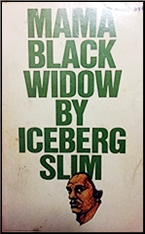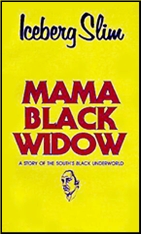Sun 23 Oct 2022
ICEBERG SLIM – Mama Black Widow. Holloway House, paperback, 1969, as by Robert Beck. Also published as by Iceberg Slim: Holloway House, UK, hardcover, 1992, and Holloway House, US, paperback, 1996, as well as several later printings. (Anything published by Holloway House has a complicated printing history; corrections gratefully accepted.)

The nightmare life story of Otis Tilson, a Black drag queen born on a Mississippi plantation in the 20’s, living until the end of the 60’s in the Chicago ghettos.
In the intro, Iceberg Slim claims that the book is a transcript of a 1969 tape recording of the flamboyant drag queen Otis Tilson (Tillie). Now normally I don’t care if something is ‘true’ or ‘fiction’ as long as it’s good. And, to me, the difference between non-fiction and fiction is blurrier than we’d like to admit. But whatever. The only reason I bring it up is that if it is a work of fiction, one really can question what the point of it is. Oscar Wilde says: “We can forgive a man for making a useful thing as long as he does not admire it. The only excuse for making a useless thing is that one admires it intensely.†So what to make of something both unadmirable and useless?
On the other hand, if it’s just a life story, you might say, ‘it is what it is’. I disagree. One’s life is capable of interpretation just like anything else. Schopenhauer says somewhere that the main difference between the ‘great lives’ we read about in books and the boring lives we live are that we experience our lives in mediocre ways. That were we to experience our lives with great exuberance, verve, desire and will, our lives too would be of magnificent import. And in our life stories magnificent import we’d impart. Cf the films Birdman, Toto le héros, Kiss of the Spider Woman, or even The Secret Life of Walter Mitty or Harvey to see the ways that a crappy life can be redeemed with a bit of imagination.
Anywho. This one is unredeemable.

Otis’s father Frank makes his living as a cotton sharecropper and part-time preacher. His father ‘saves’ and marries the beautiful Sedelia, seducing her with the words of Jesus Christ, stealing her away from the brothel life in which she lived with her older cousin Bunny. The father is a strong, proud man, muscular and moral.
Sedelia’s beguiled by tales of indoor plumbing in the jewel bedazzled city of Chicago from cousin Bunny, who has moved there to strut her wares. Sedelia begs and begs then threatens and begs some more til her husband agrees to cash out the farm for $37, leaving the only life he’d ever known, and they move to Chicago.
In Chicago it’s just one disaster after the other. It’s the depression and Frank can’t find work. The trade unions are all whites-only. Praying to Christ for work to support his family, Frank fails. Sedelia starts sleeping with the rich preacher of the local church who drives a Cadillac and showers her with furs. Sedilia flaunts her infidelity in her husband’s face, driving him to drink, diabetes and death.
Meanwhile Otis, at age 9, is molested by a church deacon who promises him that any of his wishes will come true if only he brings tears of joy to his ‘magic wand’. Otis says: “Really? Can your magic wand give my father a job and make my parents stop fighting?†“Absolutely!†exclaims the deacon. But let’s keep it a secret just us two.

Otis’s sister Carol falls in love with a white chubby baker. But Sedelia has promised Carol to the local numbers shark in exchange for corned beef, jewels and hard cold cash. So when Mama Black Widow (i.e. Sedelia) finds out that 17 year old Carol is planning to elope with the baker and bear his child, Sedelia kicks her in the belly til she miscarries, cuts out the fetus with a razor blade, and throws it in the garbage can. Carol keeps crying ‘why’d you kill my baby’, gets up in the night to retrieve it from the trash, and bleeds to death in the bed clutching her dead fetus to her breast.
It only gets worse from there. Carol’s twin sister Bertha turns to whoring and is immolated by a john, and Frank Jr. avenges her death by killing Bertha’s white pimp, getting sentenced to life without parole.
Otis is only attracted to men. He dresses in drag, and he is quite beautiful. He picks men up at bars, and gets sodomized and beaten. Over and over again.
(SPOILER ALERT)
Then he kills himself.
Then End.
Good lord. Surely one of the bleakest books of all time. And as the title shows, he blames it all on his mother: The Black Widow.
Avoid at all costs unless you’re into self-flagellation. In which case: highly recommended. Also recommended anyone who believes that things couldn’t possibly get any worse.
October 24th, 2022 at 6:32 pm
I know this bleak and gritty kind of book about the dark side of life and mostly irredeemable people is often highly praised for its portrait of life without the blinders on, but I prefer the blinders unless there is considerably more art in the telling than here. This is no THE COLOR PURPLE or BELOVED, there is nothing uplifting here, not even in the art of the writing.
Roll in the gutter if you will, it doesn’t cleanse you unless there is something to take away from it other than the feeling you need a hot bath after reading it.
October 25th, 2022 at 2:28 pm
There is a long article online entitled “Holloway House and the Black Literary Underground”
https://www.aaihs.org/holloway-house-and-the-black-literary-underground/
Here’s the first paragraph:
“How do authors such as Robert Beck (Iceberg Slim) and Donald Goines go from catering to white audiences with “black sleaze†to becoming embraced by artists such as Ice T, Dave Chappelle, Chris Rock and others as “culturally authentic†and part of the “black literary undergroundâ€? Kinohi Nishikawa’s Street Players: Black Pulp Fiction and the Making of a Literary Underground (2018) does just this by tracing the history of white publishers Bentley Morris and Ralph Weinstock’s Holloway House from its emergence in the late 1960s to its closing in 2008. Throughout Street Players, Nishikawa explores the ways that publishers market books and how audiences receive them. To do this, he deploys Robert Darnton’s communications circuit to ultimately “explain the relationship between Holloway House’s producers, Morris and Weinstock, and its legions of fans, black readers.””
October 26th, 2022 at 8:21 pm
I like Goines and enjoyed reading him, I don’t think this is in the same class.
October 27th, 2022 at 9:11 am
David,
Any particular Goines you’d recommend? I’ve started a couple of them and gave them up after finding the lingo less than credible–like it was purposely cleaned up for middle class white audiences. I’ll exaggerate here because I don’t feel like looking for a real quote, but it felt like dealers and pimps were talking like some inner city Wally from Leave it to Beaver. ‘Gosh darnit, Bernice! Can’t you see that I am trying to get myself into a piece of the action in this here burg?’
October 30th, 2022 at 11:43 pm
Tony,
Honestly, I read them last forty years ago and no one title stands out.
Your critique is fair, and on the nose, but despite that there was some authenticity to the voice. I don’t think he ever comes anywhere near Chester Himes, a genuinely fine writer, and though white George Baxt’s Pharo Love and Ed Lacey’s Toussaint L’Overture both felt more “authentic” in terms of language but my memory of Goines was overall favorable, though I am willing to confess I may have been giving him way too much leeway simply for being one of the few Black voices in the genre at the time.
At least one of his books was adapted into a very good graphic novel, DADDY COOL, which I might volunteer as his best book too. I only read one of the A. C. Clark Kenyatta series but admired its energy.
What he might have been with discipline, time, and without the drug problem we will never know. The energy was certainly there but he wrote too fast to feed his addiction and instead of a classic you get a lot of promise and a lot of what might have beens.
His early work is too influenced by Iceberg Slim but missing some of the authenticity there. The closer he got to his own voice the better he was.
His entire literary career consisted of sixteen books between 1971 and 1975 it just isn’t long enough for even the most gifted young writer to mature. His work is all promise and too little delivery, flashes of lightning, and about as insubstantial when they don’t connect.
There is a Isak Dinesen story about Lord Byron when he is sailing to Greece where he will die, and he wonders to a sailor what work he will be remembered for and the sailor tells him he will be remembered for his life and no one work. I think that is telling of Goines, he is more interesting as a cautionary tale in the end than a writer.
Later major Black writers in the genre like Mosely and Sallis don’t seem particularly influenced by his work. He’s a better phenomenon than he is an example.
August 16th, 2023 at 10:43 am
I think that when your telling your life experiences some will resonate and others will not in my opinion his books where written from his experiences in life so it’s not made up just written from his point of view so everyone will not even understand how important his books are yes for the African American community some other races my understand but the ones that don’t will not take anything away from his books this is just my opinions but I love his books and his work it inspires me because his life was similar to Mines unfortunately